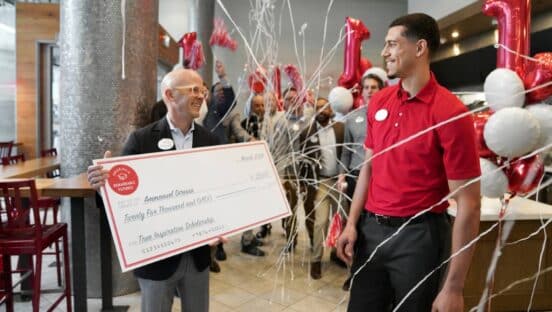Have you ever worked with a manager who provided really clear expectations and then helped you figure out how to achieve them? A manager who seemed as focused on your skill development and professional growth as the brand’s financials and operations?
When I started my career as a corporate trainer in 2002 at Potbelly Sandwich Shop, I quickly started to see the difference in locations with a strong focus on learning and development and those that handled it more as a “nice-to-have.” The managers who used the training resources available to them as a tool to help their team develop ended up with better customer experiences, lower turnover, stronger profitability, and usually a reputation for being an effective and impactful leader.
One of the promises a great operator should make to their employees is that they will gain experiences and skills that help them grow professionally and personally at work. It’s where engagement starts and where culture thrives. As an operator, you should be obsessed with ensuring that you are providing your employees with a positive experience—not focused only on their happiness, but also on their growth.
Leveraging the power of a strong and consistent approach to training, learning, and development can help you craft a culture of engaged and productive employees. Here are some ideas to get you started.
Get clear on the role of training
Before you ever take a training workbook off the shelf or enroll your team in your company’s latest online offering, take some time to get clear on why training matters for them, for you, and for your team. This is the classic what’s-in-it-for-me recommendation that asks you to think about the benefits for your employee. Think about how the training will improve their skills, their experience, or paycheck. Make sure you can provide clear rationale for the training.
Once you’ve done that, get specific about the objectives for the training. You should be able to define it by finishing the sentence, “After this training, you will be able to…” This is important, because you want to be able to define not only why the training is beneficial to the employee, but also how they will improve after attending. Think of this like creating a shared vision of success.
Go beyond the information and knowledge collection
Training can often become about completing a course, collecting certifications, or cramming knowledge and information to pass a test. Restaurants with a great culture know that the real focus should be on behavior change and gaining skills. If your training relies on observing and reading but not much doing on the part of your employee, you can improve your chances of success by giving them opportunities to experience the information, put it into use, and improve their behavior.
You can add an extra layer of effectiveness by using a before-and-after approach for measuring success. For example, if you are going to have your team attend some upsell training, then you should use data to break down their check average. Then track some results every shift after training to show them how they are developing useful skills.
Create a culture of continued learning
Learning and development often end at the conclusion of the formal training provided by the HR or training department. When the checklists, tests, and role-plays are over, this is where real learning and development occur. Great managers are able to use the end of training programs to define what’s next for their employees. Make time to touch base at the end of your employee’s training or workshop to talk about how they can use their new skills going forward, and specifically help them find ways to use the new skills within the few days after training.
You can ask them questions like, how will they use the new skills? What do they think they will do differently because of the training? Where do they want some help bringing the skills to life? Schedule some meetings for the weeks following the learning to see how things are going.
Celebrate training success
After the training and learning event has ended, make sure to focus on celebrating the success your team is having. You can do this by bringing up achievements in pre-shift meetings, posting notes on your staff notification board, sharing pictures on social media, or giving away some prizes. But the most effective way might just be giving direct feedback to your employee about what you are seeing and how it’s impacting the restaurant positively.












